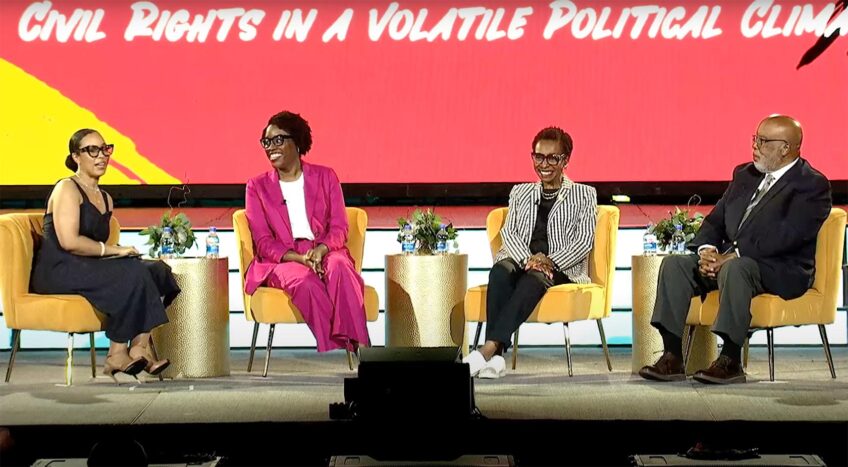
City councilors John Connolly and Steven Murphy are calling for an all-incumbent slate in the race for the council’s four at-large seats, closing ranks against a challenge by former top vote-getter Michael Flaherty who is seeking to regain the seat he gave up in his 2009 failed bid for mayor.
“I go to work every day for one Boston — where we recognize that we’re strengthened by our diversity,” said incumbent John Connolly, sounding the theme for his campaign during a debate at the Ward 5 Democratic Committee meeting last week. “We don’t always agree on everything, but we work together. That’s one Boston.”
Incumbent Stephen Murphy made the same call during the Ward 5 debate.
“It’s an honor to work with my colleagues and I hope you’ll send us back,” he said.
Connolly and Murphy made a similar call during a meeting of the Ward 19 Democratic Committee on June 6. Incumbent Felix Arroyo, present at both meetings, said it’s too early in the race to make a decision about running as a slate. Incumbent Ayanna Pressley, whose mother is ill, was not present at either debate.
The talk of a slate has injected a dose of intrigue into a race where candidates and incumbents typically sound similar themes around the shared priorities of schools, public safety, neighborhood services and economic development. This is the first time in recent memory there has been talk of a slate of incumbent candidates.
Political pundits reached by the Banner agreed with Arroyo’s position that it’s early for a slate.
“At this stage, each candidate needs to identify who they are and what they stand for,” said political activist Marvin Venay.
District 4 Councilor Yancey, who represents parts of Dorchester and Mattapan, didn’t like the idea of a slate either. “A slate approach is really simplistic and doesn’t allow candidates to state their positions,” he said. “It assumes that all candidates are alike and vote alike.”
Yancey points to a resolution he filed calling for hiring 300 more street workers. The resolution lost, with all nine white councilors voting against.
“I think that’s kind of telling in terms of where the councilors are coming from,” Yancey said.
Connolly and Murphy’s unusual proposal may be driven by the return of their former colleague, former at-large councilor Michael Flaherty, who routinely topped the at-large ticket before abandoning his council seat in his failed 2009 bid for mayor.
Both Connolly and Muphy poll strongly in the traditional Irish Catholic strongholds of South Boston, the West Roxbury and Neponset, Savin Hill and Cedar Grove sections of Dorchester. Flaherty, who hails from Southie, draws from the same base.
Arroyo and Pressley tend to poll better in the city’s predominantly black and Latino neighborhoods in Roxbury, Dorchester, Mattapan and Hyde Park. They also beat out Connolly, Murphy and Flaherty in white progressive neighborhoods like Jamaica Plain and the Fenway.
Venay says a slate would only work to everyone’s advantage if Murphy and Connolly push it in their bases in West Roxbury and South Boston.
“Voters in all those neighborhoods would have to be fully aware of why they’re unified,” he said.
Historically, when white candidates have endorsed candidates of color in city-wide races, the arrangement hasn’t worked to everyone’s advantage. In 1997, then at-large councilor Peggy Davis Mullen made an unsolicited endorsement of Frank Jones, the sole African American in the at-large race, a move seen as an attempt to shore up her credentials in the progressive community. Jones did not fare well in Davis Mullen’s base of predominantly white voters in South Boston and West Roxbury.
Yancey points to a similar move by former councilor Larry DiCara, who endorsed African American candidate Clarence Dilday. Dilday lost. DiCara won.
For his part, Flaherty is capitalizing on his outsider status. At the Ward 5 meeting last week, he acknowledged the cold shoulder his two Irish American colleagues were giving him.
“I’m not going to be endorsed by the other councilors,” he said. “They’re probably endorsing each other. I also won’t be endorsed by the mayor. I’m beholden to no one.”
In contrast, each of the three incumbents stressed their ability to work together on the council and cited their ability to work with the Menino administration.
Arroyo, who clashed with Menino over the mayor’s plans to close branch libraries, cited his collaboration with Back Bay state Rep. Marty Walsz, who helped secure state funding to keep the branch libraries open.
Predictably, schools, public safety and city services dominated the candidates’ messaging in the Ward 5 debate. Despite the talk of unity on the council, the issue of neighborhood schools revealed sharp divisions among the incumbents. In response to a question about keeping families with children in the city, Murphy and Connolly called for an end to busing, noting that the schools and the city are well integrated.
Connolly said the $80 million the city spends on busing could be better spent providing arts programs in the schools.
“We’re spending $80 million a year re-arranging deck chairs on the Titanic,” he said.
In a city where some neighborhoods, like West Roxbury and Jamaica Plain, have more schools and other neighborhoods, like Roxbury and Dorchester have more students than seats available, neighborhood schools remains a divisive issue among black and white elected officials.
“Good luck with neighborhood schools if you don’t have one,” Arroyo said.
There are no public schools in the Back Bay and Beacon Hill.
Arroyo and other councilors said they would work to get a public school built in the Back Bay.







